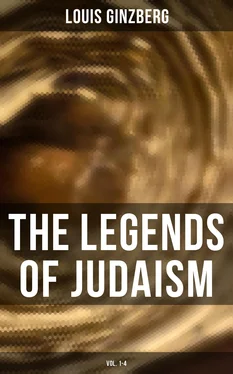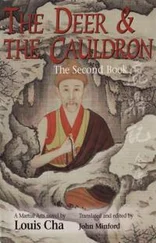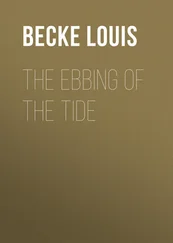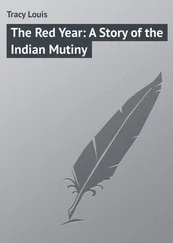Louis Ginzberg - The Legends of Judaism (Vol. 1-4)
Здесь есть возможность читать онлайн «Louis Ginzberg - The Legends of Judaism (Vol. 1-4)» — ознакомительный отрывок электронной книги совершенно бесплатно, а после прочтения отрывка купить полную версию. В некоторых случаях можно слушать аудио, скачать через торрент в формате fb2 и присутствует краткое содержание. Жанр: unrecognised, на английском языке. Описание произведения, (предисловие) а так же отзывы посетителей доступны на портале библиотеки ЛибКат.
- Название:The Legends of Judaism (Vol. 1-4)
- Автор:
- Жанр:
- Год:неизвестен
- ISBN:нет данных
- Рейтинг книги:5 / 5. Голосов: 1
-
Избранное:Добавить в избранное
- Отзывы:
-
Ваша оценка:
- 100
- 1
- 2
- 3
- 4
- 5
The Legends of Judaism (Vol. 1-4): краткое содержание, описание и аннотация
Предлагаем к чтению аннотацию, описание, краткое содержание или предисловие (зависит от того, что написал сам автор книги «The Legends of Judaism (Vol. 1-4)»). Если вы не нашли необходимую информацию о книге — напишите в комментариях, мы постараемся отыскать её.
The Legends of Judaism (Vol. 1-4) — читать онлайн ознакомительный отрывок
Ниже представлен текст книги, разбитый по страницам. Система сохранения места последней прочитанной страницы, позволяет с удобством читать онлайн бесплатно книгу «The Legends of Judaism (Vol. 1-4)», без необходимости каждый раз заново искать на чём Вы остановились. Поставьте закладку, и сможете в любой момент перейти на страницу, на которой закончили чтение.
Интервал:
Закладка:
The raven is another animal that changed its appearance during its sojourn in the ark. When Noah desired to send him forth to find out about the state of the waters, he hid under the wings of the eagle. Noah found him, however, and said to him, "Go and see whether the waters have diminished." The raven pleaded: "Hast thou none other among all the birds to send on this errand?" Noah: "My power extends no further than over thee and the dove." But the raven was not satisfied. He said to Noah with great insolence: "Thou sendest me forth only that I may meet my death, and thou wishest my death that my wife may be at thy service." Thereupon Noah cursed the raven thus: "May thy mouth, which has spoken evil against me, be accursed, and thy intercourse with thy wife be only through it." All the animals in the ark said Amen. And this is the reason why a mass of spittle runs from the mouth of the male raven into the mouth of the female during the act of copulation, and only thus the female is impregnated. Altogether the raven is an unattractive animal. He is unkind toward his own young so long as their bodies are not covered with black feathers, though as a rule ravens love one another. God therefore takes the young ravens under His special protection. From their own excrement maggots come forth, which serve as their food during the three days that elapse after their birth, until their white feathers turn black and their parents recognize them as their offspring and care for them.
The raven has himself to blame also for the awkward hop in his gait. He observed the graceful step of the dove, and envious of her tried to enmulate it. The outcome was that he almost broke his bones without in the least succeeding in making himself resemble the dove, not to mention that he brought the scorn of the other animals down upon himself. His failure excited their ridicule. Then he decided to return to his own original gait, but in the interval he had unlearnt it, and he could walk neither the one way nor the other properly. His step had become a hop betwixt and between. Thus we see how true it is, that he who is dissatisfied with his small portion loses the little he has in striving for more and better things.
The steer is also one of the animals that have suffered a change in the course of time. Originally his face was entirely overgrown with hair, but now there is none on his nose, and that is because Joshua kissed him on his nose during the siege of Jericho. Joshua was an exceedingly heavy man. Horses, donkeys, and mules, none could bear him, they all broke down under his weight. What they could not do, the steer accomplished. On his back Joshua rode to the siege of Jericho, and in gratitude he bestowed a kiss upon his nose.
The serpent, too, is other than it was at first. Before the fall of man it was the cleverest of all animals created, and in form it resembled man closely. It stood upright, and was of extraordinary size. Afterward, it lost the mental advantages it had possessed as compared with other animals, and it degenerated physically, too; it was deprived of its feet, so that it could not pursue other animals and kill them. The mole and the frog had to be made harmless in similar ways; the former has no eyes, else it were irresistible, and the frog has no teeth, else no animal in the water were sure of its life.
While the cunning of the serpent wrought its own undoing, the cunning of the fox stood him in good stead in many an embarrassing situation. After Adam had committed the sin of disobedience, God delivered the whole of the animal world into the power of the Angel of Death, and He ordered him to cast one pair of each kind into the water. He and leviathan together thus have dominion over all that has life. When the Angel of Death was in the act of executing the Divine command upon the fox, he began to weep bitterly. The Angel of Death asked him the reason of his tears, and the fox replied that he was mourning the sad fate of his friend. At the same time he pointed to the figure of a fox in the sea, which was nothing but his own reflection. The Angel of Death, persuaded that a representative of the fox family had been cast into the water, let him go free. The fox told his trick to the cat, and she in turn played it on the Angel of Death. So it happened that neither cats nor foxes are represented in the water, while all other animals are.
When leviathan passed the animals in review, and missing the fox was informed of the sly way in which he had eluded his authority, he dispatched great and powerful fish on the errand of enticing the truant into the water. The fox walking along the shore espied the large number of fish, and he exclaimed, "How happy he who may always satisfy his hunger with the flesh of such as these." The fish told him, if he would but follow them, his appetite could easily be appeased. At the same time they informed him that a great honor awaited him. Leviathan, they said, was at death's door, and he had commissioned them to install the fox as his successor. They were ready to carry him on their backs, so that he had no need to fear the water, and thus they would convey him to the throne, which stood upon a huge rock. The fox yielded to these persuasions, and descended into the water. Presently an uncomfortable feeling took possession of him. He began to suspect that the tables were turned; he was being made game of instead of making game of others as usual. He urged the fish to tell him the truth, and they admitted that they had been sent out to secure his person for leviathan, who wanted his heart, that he might become as knowing as the fox, whose wisdom he had heard many extol. The fox said reproachfully: "Why did you not tell me the truth at once? Then I could have brought my heart along with me for King Leviathan, who would have showered honors upon me. As it is, you will surely suffer punishment for bringing me without my heart. The foxes, you see," he continued, "do not carry their hearts around with them. They keep them in a safe place, and when they have need of them, they fetch them thence." The fish quickly swam to shore, and landed the fox, so that he might go for his heart. No sooner did he feel dry land under his feet than he began to jump and shout, and when they urged him to go in search of his heart, and follow them, he said: "O ye fools, could I have followed you into the water, if I had not had my heart with me? Or exists there a creature able to go abroad without his heart?" The fish replied: "Come, come, thou art fooling us." Whereupon the fox: "O ye fools, if I could play a trick on the Angel of Death, how much easier was it to make game of you?" So they had to return, their errand undone, and leviathan could not but confirm the taunting judgment of the fox: "In very truth, the fox is wise of heart, and ye are fools."
ALL THINGS PRAISE THE LORD
"Whatever God created has value." Even the animals and the insects that seem useless and noxious at first sight have a vocation to fulfil. The snail trailing a moist streak after it as it crawls, and so using up its vitality, serves as a remedy for boils. The sting of a hornet is healed by the house-fly crushed and applied to the wound. The gnat, feeble creature, taking in food but never secreting it, is a specific against the poison of a viper, and this venomous reptile itself cures eruptions, while the lizard is the antidote to the scorpion. Not only do all creatures serve man, and contribute to his comfort, but also God "teacheth us through the beasts of the earth, and maketh us wise through the fowls of heaven." He endowed many animals with admirable moral qualities as a pattern for man. If the Torah had not been revealed to us, we might have learnt regard for the decencies of life from the cat, who covers her excrement with earth; regard for the property of others from the ants, who never encroach upon one another's stores; and regard for decorous conduct from the cock, who, when he desires to unite with the hen, promises to buy her a cloak long enough to reach to the ground, and when the hen reminds him of his promise, he shakes his comb and says, "May I be deprived of my comb, if I do not buy it when I have the means." The grasshopper also has a lesson to teach to man. All the summer through it sings, until its belly bursts, and death claims it. Though it knows the fate that awaits it, yet it sings on. So man should do his duty toward God, no matter what the consequences. The stork should be taken as a model in two respects. He guards the purity of his family life zealously, and toward his fellows he is compassionate and merciful. Even the frog can be the teacher of man. By the side of the water there lives a species of animals which subsist off aquatic creatures alone. When the frog notices that one of them is hungry, he goes to it of his own accord, and offers himself as food, thus fulfilling the injunction, "If thine enemy be hungry, give him bread to eat; and if he be thirsty, give him water to drink."
Читать дальшеИнтервал:
Закладка:
Похожие книги на «The Legends of Judaism (Vol. 1-4)»
Представляем Вашему вниманию похожие книги на «The Legends of Judaism (Vol. 1-4)» списком для выбора. Мы отобрали схожую по названию и смыслу литературу в надежде предоставить читателям больше вариантов отыскать новые, интересные, ещё непрочитанные произведения.
Обсуждение, отзывы о книге «The Legends of Judaism (Vol. 1-4)» и просто собственные мнения читателей. Оставьте ваши комментарии, напишите, что Вы думаете о произведении, его смысле или главных героях. Укажите что конкретно понравилось, а что нет, и почему Вы так считаете.












